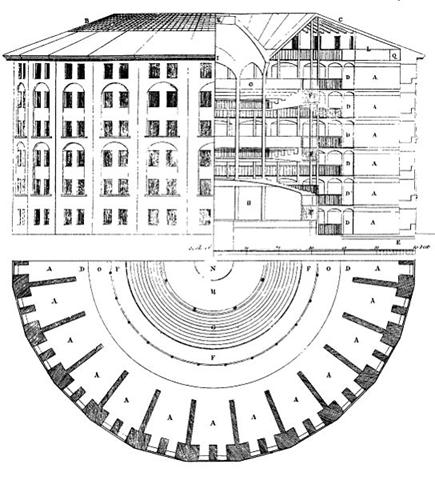As well as being the name of the least popular Decepticon in the Transformers franchise, a panopticon is a building designed to maximise oppression by enabling one watcher to watch all the building’s residents from a central location. Panoptic buildings are circular with a central observation room surrounded by numerous observable cells. This architectural plan was proposed by the philosopher, Jeremy Bentham, in the 18th century as an efficient way to observe inmates in any type of institution. It is a design that creates efficient prisons and kindergartens.

From the combination of Greek words pan meaning ‘all’ and optikos meaning ‘of sight’.
Not only is it possible for the single watcher to observe all inmates from one location, with the addition of extra features - blinds, one-way mirrors - the inmates never know when they are being watched. The fear of being caught at any time means inmates effectively watch themselves because they regulate their behaviour as if they are always being scrutinised.

Panopticism has applications beyond incarceration and expensive take-away coffee. The term also describes any situation where humans monitor their own behaviour due to the fear of an unseen observer. Today, panopticism is more popular than ever. Increasing use of public security cameras and ubiquitous mobile phone cameras mean that everyone is potentially being watched at any time. The resulting increase in self-regulation is considered by some people to be oppressive. Oppressive governments disagree, so are waging a public relations battle with a campaign of PanoptimismTM.
Given the choice to be any one thing for the rest of its
life, a human would choose to be happy
rich handsome funny
strong decisive George Clooney
perfect.
The perfect human is happy, rich, handsome, funny, strong, decisive and George Clooney. It never makes mistake or contradicts itself, and when it does it is easily forgiven for its shortcomings.
In lieu of actual perfection, which is hard work, humans settle for the image of perfection, which is hard work. The superficial perfectionist achieves “perfection” by adhering to one of the free market’s prevailing definitions of the perfect human. Here are some examples.
Skinny and fit passive nymph in a breezy, summer dress that clings to the thigh.
Strong, independent businesswoman, who takes control in the boardroom and the bedroom, in an elegant pencil skirt that clings to the thigh.
Bookish, hidden sex-bomb in a buttoned, white shirt and plaid skirt that clings to the thigh.
Domestic goddess, who can have it all, in heels and a short apron that clings to the thigh.
Emotionally available tough guy.
At a distance these humans appear perfect but get closer and flaws can be seen. This is why the second step of superficial perfection is isolation.
Appear perfect at a distance.
Keep everyone at a distance.
Real perfection is tougher to attain, as demonstrated by the fact that only one human has achieved it. The problem is the lack of a universal benchmark against which every human can measure itself.
Humans make do by gauging their relative perfection against colleagues, friends and family. A human can say it is perfect if it is the best of the people it knows. It says “I’m the most emotionally available tough guy I know,” until a tougher or more available guy comes along.
The weakness of this relative measurement is the vast pool of competitors created by mass media and the Internet. A human in an isolated group will always find something it is best at, so relative perfection is attainable. But a human with access to television and the Internet will find nothing it excels at, so perfection is impossible. In other words, when a human thinks too much of itself, George Clooney will be there to decisively burst its bubble.
The human desire to make statements that are both very important and not at all helpful has given rise to philosophy. It is a broad church that aims to understand the world, if possible, without church. Famous philosophers include Calvin, Hobbes and Calvin & Hobbes. The most philosophical statement ever made is,
“I think therefore I am.” - Rene Descartes
For a normal human, this statement is straightforward, but for a philosophical human this statement raises many questions.
What is “I”?
What does it mean to think?
What is “I” a second time?
Can “I” get tenure for this?
It is better to reduce the statement to its simplest form before studying it. Expressed as a mathematical equation, the statement reads,
I think = I am
As ‘I’ is common to both sides, it can be eliminated.
think = am
It is safe to assume that while the philosopher is thinking the philosopher’s being consists only of this action, therefore,
think = think, or
am = am
Eliminating the common element from each side leaves,
=
and translating back into English, the philosophical statement becomes,
therefore
Or, if tenure is required,
therefore*
Celebrity philosopher, Plato, was one of the best creators of important, empty words. His Allegory (read story) of the Cave being the most empty of all. And it goes a little something like this - 5, 6, 7, 8.
Some humans live in a cave and are chained such that they can only see the wall in front of them. Other, unchained humans carry on life behind the trapped cave dwellers. Their shadows are cast onto the wall in front of the cave dwellers. These shadows are all the cave dwellers see of life. If released to observe life beyond the shadows, they would not understand what they are seeing because the shadows are all they know. And if they ever left the cave and saw the brightness of the sun, it would blind them and send them scurrying back to their cave. Life beyond what they know might be too much for them to take, and they may even beg to be chained again.
While this allegory is not as catchy as I think therefore I am, it does contain some important, if empty, ideas.
Are ordinary humans chained in vision and understanding like the cave dwellers?
How can chained humans be released to see the world anew? Should they be?
What is the brightness of the sun that scares the cave dwellers back to the comfortable shadows? Would sunglasses help?
At first glance, this simple allestory appears simple, but with philosophical thought, it can easily be complicated. To keep this complication under control, the allegory can be shown to be reduced to,
therefore
Or, if tenure is required,
therefore*

Piracy covers a range of cool and illegal acts carried out at sea and on land. It includes robbery, violence, swashbuckling and destroying the music industry. Old-timey piracy occurred on the high seas, but modern piracy operates from bedrooms, kitchenettes and landlocked WiFi hotspots.
A pirate is contrasted with a privateer who was a legal pirate sanctioned by an authority to attack and rob enemy vessels during wartime. Privateering was considered an honourable and patriotic way to murder and pillage. However, the attacked enemy would consider a privateer nothing more than a pirate: one man’s trash is another man’s treasure. Or, as the pirate says, “one man’s treasure is another man’s treasure.”

Prayer is a human’s private conversation with God. It can be offered at any time during the day or night, but it is typically given just before a human goes to bed or is executed. Muslim humans pray many times every day, but they are still only required to go to bed once per day.

Prayers have a number of applications in the real world. Firstly, when a human wants something really badly, such as the destruction of its numerous enemies, it will pray to its chosen gods to make that happen. Secondly, a human uses prayer to remind itself what is important. For example, an impatient human will use prayer to remind itself that other people are always going to be slow and stupid, so don’t bother getting upset about it.
Prayer has been shown to be effective, but the reasons for this are not understood. The obvious explanation is that God listens to all the incoming wishes and grants them according to worthiness and any pertinent time pressures. Scientists refuse to accept this explanation on the grounds that God doesn’t exist. They prefer to imagine that prayer is effective insofar as it reminds and motivates the praying human to get its act together and do things for itself.
A human is encouraged to pen custom prayers for its own unique situation. In lieu of imagination and effort, a human can fall back on standard prayers. For example,
Now I lay me down to sleep,
I pray the Lord my soul to keep.
And if I die before I wake,
I pray the Lord my soul to take.
This standard prayer will notify God of the prayer-giver’s wishes regarding unscheduled, nocturnal death. It is not as meaningful as some of the unique prayers that humans have produced. For example, before entering a sack race,
Now I sack me up to race,
I pray the Lord maintains my pace.
And if I lose to Jim or Bill,
I pray the Lord will kill, kill, kill.
Or when embarking on a big night out,
Now I have my credit card,
I pray the Lord my balance guard.
But if I lose my self-control,
I thank the Lord for alcohol.
The great project of humans is to progress themselves from here to there. They don’t know what’s there or where it is, but they know it’s better than here. Any human that does not progress is wrong to be here and should better itself to get there.
Humans have special words to progress themselves from here to there. They say things ‘should’ be ‘better’: People should know how to spell, cucumbers should be cheaper, the Earth should be cared for. In general, everything should be better.
Should is a powerful word to push humans away from here because it takes no effort to say yet makes the human understand it has not progressed enough. In a human’s self-judgement, it does not matter what a human could do, it only matters what it should do. Lack of ability, energy, time and support are not valid excuses because what you can do does not limit what you shan do.
Better is a powerful word to push humans away from here because it is a relative term. A human can always say that things are better there, no matter how good things are here.

A human’s progress towards progress is encucumbered by standard human shortcomings, which are sloth, envy, greed, gluttony, pride, lust, wrath and poor spelling. In its blind, mispelled pursiut of progress, a human must overcome these eight deadly sins. Every human is predisposed by evolution to be lazy, envious, greedy, gluttonous, prideful, lustful, wrathful and mispellful. These are tempting distractions that stop a human’s progress from what can be to what shan be.

For thousands of years philosophical humans made it their purpose to prove that human life has no purpose. Their paradox succeeded because pure purpose, detached from any human, has never been found. Despite its non-existence humans like purpose, and a purposeful human finds it easier to get up and face the day.
“A human with a why can withstand any how.” - Friedrich Nietzsche
A purposeless human may struggle in everyday existence because without a why effort seems pointless.
“A human with[out] a why can[not] withstand any how.” - [not] Friedrich Nietzsche
To benefit from a purpose a human can adopt one. Common purposes are,
become famous,
raise a family,
unify two unrelated ideas, or
raise a famous family.
For a human that finds these standard purposes (purpi?) unsuitable, they can adopt one of two default purpi.
Fulfill God’s plan.
Become fully human/itself.
God’s plan is covered extensively in other publications so is not repeated here.1
To become fully itself a human must distinguish between what it really is and what it has been told to be. This is the difference between the human without ego and the human with ego, where the ego is what the human has been told to be. Useful resources to do this are listed here from most to least expensive.
Psychoanalysis
Meditation retreat
Self-help books
Philosophy
God’s plan
This seems like an admission that this book does not cover Everything but intentional omission is a way to include incompleteness within a book that covers Everything. It is like a beautiful Persian rug that includes a deliberate bad stitch to acknowledge that only Allah is perfect.↩︎